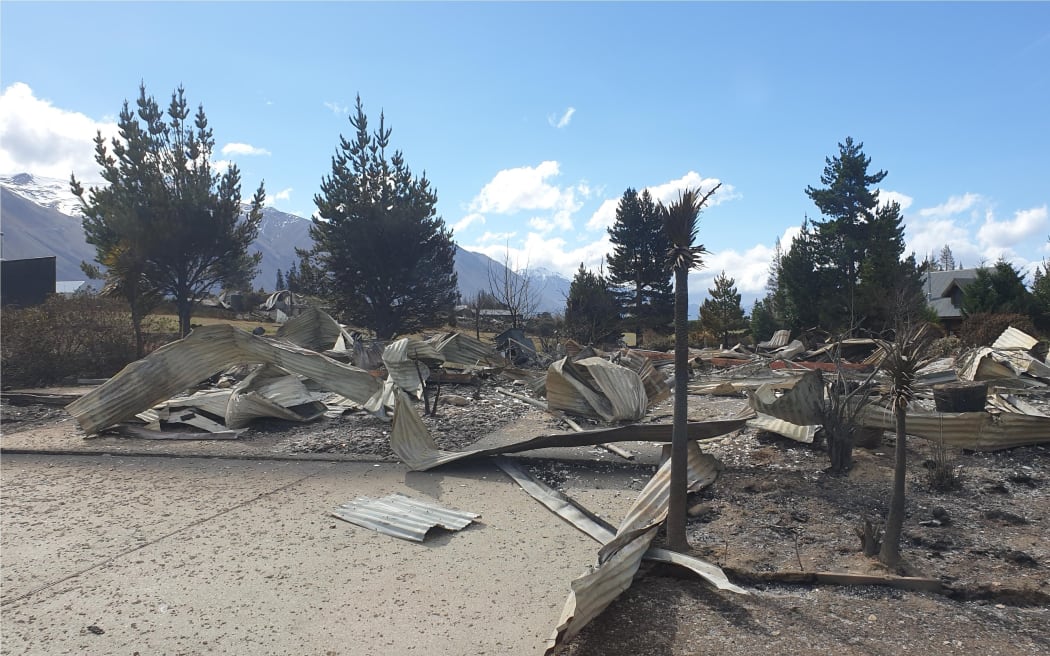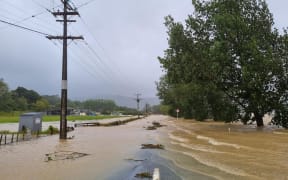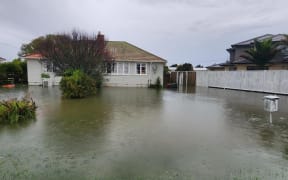
Official Information Act papers disclose USAR crews have had to use their personal vehicles to go to at least half a dozen major emergencies, including the Lake Ōhau fire. File photo Photo: RNZ / Anan Zaki
The country's fleet of specialist search and rescue vehicles is so bad that the rescuers have begun rebelling.
In July, two specialist firefighters lashed out in emails, saying they would no longer keep "wearing out their own cars, trucks, utes, and trailers" preparing for training exercises.
Their team leader weighed in, labelling Fire and Emergency "totally unprofessional".
Urban Search and Rescue (USAR) has been relying on just two dedicated utes, one so old it has 350,000km on the clock and is of such "dubious safety" they do not drive it over to the West Coast, despite recurring floods there, newly released Official Information Act papers disclose.
They show the USAR crews have had to use their own personal vehicles to go to at least half a dozen major emergencies, including the Lake Ōhau fire and shoreside for the Whaakari eruption.
Even after the fleet came up short in Cyclone Gabrielle in February - when USAR tried to hire utes and trailers but could not find any - Fire and Emergency has been slow to act.
The stakes of too few 4WDs (four-wheel drives) in a risk assessment are high: "Possible increased loss of saveable lives and property."
The OIA documents show Fire and Emergency New Zealand (FENZ) bosses have had warnings from their own front line since 2019 that the state of the USAR fleet "slows the response, slows the delivery of personnel and assets, leads to unsafe use of unsuitable vehicles, and ultimately leads to poor outcomes for New Zealanders in their time of need".
Just last month a deputy chief executive, Dr Steph Rotarangi, emailed managers asking:
"I asked for the [utes] Business Case... I haven't seen anything to date."
The reply: "The business case for vehicles has stalled."
USAR has seen a big uptick in demand, at the front line in rescues and searches when slips come down, buildings collapse such as in the Christchurch quake, trenches fail and as specialist backup in floods and major fires, but not a matching boost in vehicle resources.
It was "not adequately resourced in terms of going out the door", national USAR head Ian Duncan wrote in a business case for utes and trucks in late 2020.
FENZ fleet administrators wrote back to him, saying he should "tell a more compelling story, highlighting the consequences for not following the proposal".
So he did, in February 2021, stating that across multiple major emergencies from the February 2019 Nelson fires onwards, "vehicles for travel were borrowed ... borrowed FENZ utes ... personal vehicles were used".
He tried to get new utes to carry the teams, and two new trucks to carry their gear, because two of the three USAR trucks nationwide are so old they are breaking down.
Duncan's business cases were not enough to spur action. For although FENZ chief executive Kerry Gregory actually approved the case, the utes did not show up.
Back then the two utes would have cost $12,000 a year to lease, covered out of existing USAR budgets, at an agency that collects fire levies of more than $600 million a year.
A year ago, senior leaders were debating it again:
"I don't see any issue" but "the challenge will be allocation from with the fleet budget to get this done" because FENZ needed new fire trucks, too, Wellington region manager Bruce Stubbs said.
At a USAR squad leaders meeting in June this year, frustrations boiled over.
"Our priority is a 4-wheel drive Ute, are these just sitting on a shelf or what?" minutes show one leader asking.
"Where do these business cases go to? How long does a business cases [sic] take to get some action?" said another.
"We have a ute that fleet want to steal from us, we are supposed to be getting 2 new vehicles, we are still waiting," said a third.
Rotarangi in October referred her managers to an RNZ story about the mad scramble for utes during Gabrielle. "Just in case you haven't caught up on this already. You may wish to circulate," she wrote them.
"It's a reminder that I asked for the Business Case."
In a statement to RNZ, she said FENZ was "committed" to ensuring USAR had access to appropriate vehicles.
"The provision of vehicles for USAR has been a long-standing issue and getting this right has taken some time," Rotarangi said, and needed "to be balanced with our broader mandate across the country".
The storms this year provided "lessons and observations which have allowed us to look for ways to improve our approach".
They now planned to swap in four leased utes from other parts of the agency soon, to triple USAR's ute fleet, "until the longer-term business case is approved", FENZ said.
Rotarangi called it a "comprehensive business case for enhanced specialist vehicle capability".
This is similar to what Ian Duncan drew up twice in 2020-21; and has echoes in a reference to the need for a fleet "stocktake" in 2018.
A USAR leader, told a few weeks ago that the ute they had borrowed for use at training at Ardmore was going to be replaced by a "more permanent solution", emailed: "Given recent events surrounding the Ute, there is a lack of trust that this will happen."
Tomorrow: A second story in this two-part series, looking at USAR's old but vital trucks.





